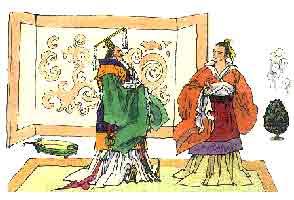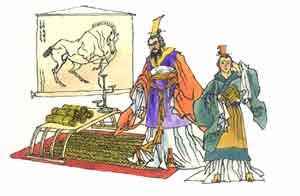| Chinese Idioms Learning (20) | |
|---|---|
| Jan 9, 2008 00:35 | |
 | Source: www.jsedu.net. No.1 退避三舍 (Tui 4 Bi 4 San 1 She 3). It literaly means "retreating 30 lis". One li equals 0.3 mile. Story: During the Spring and Autumn Period (770-476 B.C.), Duke Xian of the State of Jin Killed the crown prince Sheng because he had heard slanders about Sheng and believed them. He also sent his men to arrest Chong Er, Shen Sheng and believed them. He also sent his men to arrest Chonh Er, Shen Sheng's brother. Hearing the news, Chong Er escaped from the state of Jin, remaining a fugitive for more than ten years. After innumerable hardships, Chong Er arrived at the State of Chu at last. King Cheng of the State of Chu treated him with high respect as he would have treated the ruler of a state, believing that he would have a vright fuure. One day, King Cheng of the State of Chu gave a banquet in honoudr of Chong Er. Suddenly, amid the harmonious atmosphere of drinking and talking, King Cheng of the State of Chu asked Chong Er. "How will you repay me when you return to the State of Jin and become its ruler one day?" After thinking for a moment, Chong Er said, "You have plenty of beauties and attendants as well as jewelry and silk cloth, and the state of Chu abounds in rare brides and animals. What treasure can the State of Jin boast having to present to your majesty?" King Cheng of the State of Chu said, "You are too modest. Nevertheless, you still have to show your gratitude to me in one way or another, I presume?" Smiling, Chong Er answered, "If I should be fortunate enouge to return to the State of Jin and become its ruler, the State of Jin would be friendly to the State of Chu. If, one day, there should be a war between the two states, I would definitely order my troops to retreat three SHE (one SHE is equivalent to thirty LI. The LI is a Chinese unit of length equivalent to 1/2 kilometre. And, therefore, three SHE is about thirty miles.) as a condition for peace. If, under that condition, you were still not reconciled, I would have to fight with you." Four years later, as might be expected, Chong Er returned to the State of Jin and became its ruler. He was none other than Duke Wen of the State of Jin famous in ancient Chinese history. Ruled by him, the State of Jin became increasingly powerful. In the year 533 B.C., the Chu troops and the Jin troops confronted each other in a battle. Faithful to his promise, Duke Wen of the State of Jin ordered his troops to retreat about thirty miles. After retreating, the Jin troops were stationed at Chengpu. Seeing that the Jin troops were retreating, the Chu troops thought that the enemy troops were afraid, and began chasing them. Taking advantage of the Chu troops' arrogance and their talking the Jin troops lightly, the Jin troops concentrated their forces and inflicted a crushing defeat on the Chu troops, thus winning the victory of the battle of Chengpu.  |
| Jan 9, 2008 00:36 | |
 | This set phrase, "retreating about thirty lis," is derived from the Chapter "The Twenty-second Year of Duke Xi" in ZuoZhuan, the famous commentary by Zuo Qiuming on The spring and Autumn Annals. The idea of this set phrase is to give way to somebody in order to avoid a conflict. |
| Jan 9, 2008 00:38 | |
 | No.2 按图索骥 (An 4 Tu 2 Suo 3 Ji 4). It means' looking for a steed with the aid of its picture'. Story: During the Spring and Autumn Period, there was a man in the State of Qin whose name was Sun Yang. Sun Yang was very expert in looking at horses and judging their worth. Whatever the horse might be, he could tell whether it was good or bad at first sight. People called him Bo Le (Bo Le was the name of one of the celestial bodies and was fabled to be in charge of heavenly steeds), and he was often asked to appraise and select horses. One day, when Sun Yang was passing a place, an old horse pulling a cart loaded with salt suddenly neighed to him without stopping. He came near, and saw that it was a horse that really could cover a thousand Li a day, and that the only problem with it was that it was a little too old. The old horse was pulling the heavy cart with difficulties and hardships. Sun Yang felt acutely that the horse was really unjustly treated, for it might have been a fine steed galloping on the battlefield. It was a great pity that it was pulling the cart loaded with salt without attracting public attention, which had taken the edge off its spirit and consumed its energy. When he thought of this, he was so grieved that he shed tears. In order to help more people learn how to appraise horses so that fine horses which could cover a thousand LI a day would no longer fall into oblivion, and also in order to ensure that his unique skill in judging horses would not be lost, Sun Yang worte a book entitled The Art of Looking at Horses and Judging Their Worth, based on his experiences and knowledge accumulated over the years. The book was also illustrated with the pictures of various horses. Sun Yang had a son who, after reading his father's The Art of Looking at Horses and Judging Their Worth, thought it was very esay to appraise horses. So he took the book with him to look for fine horses everywhere. At first he searched according to the pictures in the book, and accomplished nothing. Then he searched according to the characteristics of a toad fit very well the characteristics described in the book. So he happily took the toad back home, and said to his father, "Father, I have found a horse that can cover a thousand Li a day, only its hoofs are not good enough." Looking at the toad, Sun Yang did not know whether he should laugh or cry. Knowing that his son was stupid, Sun Yang said humourously. "It's a pity that this horse is too fond of jumping to pull a cart." Then he sighed, "That is just what we call looking for a steed with the aid of its picture." Later, people have used the set phrase "look for a steed with the aid of its picture" to refer to handling affairs mechanically in the outmoded ways without being flexible. Somethimes it is also used to refer to trying to locate something by following up a clue. This set phrase originates in Lumbering in the Forest of Art written by Yang Shen in the Ming Dynasty.  |
Post a Reply to: Chinese Idioms Learning (20)





 Copyright © 1998-2026 All rights reserved.
Copyright © 1998-2026 All rights reserved.